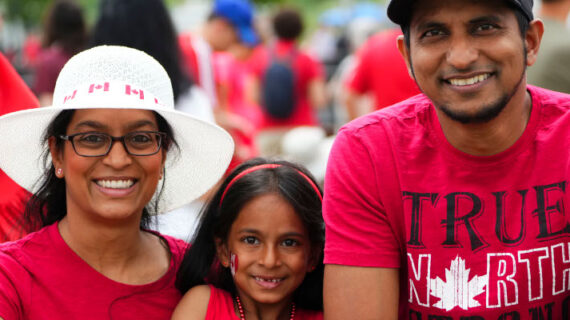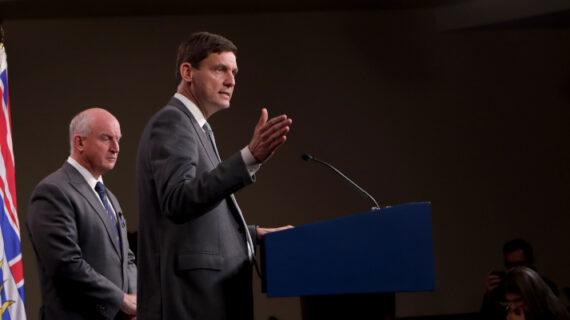- CBC president and CEO Catherine Tait sparred with Conservative MP Melissa Lantsman about the broadcaster's coverage of the Israel-Hamas War. In their exchange Tait said she refused to retract headlines about the October 17 hospital explosion.
- The New York Times released an editor’s note that acknowledged that it relied too heavily on information provided by Hamas and noted the newspaper would be more careful with facts coming out of Gaza. The BBC also admitted it made mistakes when reporting on the hospital blast.
- Lantsman says inaccurate reporting risks inflaming antisemitism and puts communities here in Canada at risk.
Last week, CBC’s president and CEO Catherine Tait appeared before the federal heritage committee and clashed with Conservative MP Melissa Lantsman over the public broadcaster’s coverage of the ongoing war between Israel and Hamas.
Some political and industry voices say that Tait’s behaviour at the committee was arrogant, and the CBC’s coverage of the Hamas terrorist attack and the ensuing war reflects a lack of public accountability on the part of the broadcaster.
One flashpoint was CBC’s coverage of an explosion that occurred at Al-Ahli Arab Hospital in Gaza, which Hamas-run government agencies in Gaza stated killed 471 people. Hamas blamed an Israeli airstrike for the explosion, while Israel rejected these claims and instead blamed the incident on a misfired rocket launched from Gaza by Hamas. CBC ran a story on the day of the explosion from the Associated Press with the headline “Palestinians say hundreds killed in Israeli airstrike on hospital; Israel blames Islamic Jihad.”
Other outlets like the New York Times and the BBC also laid the blame on Israeli airstrikes during their initial reporting on the explosion. Examination of later evidence, including the size of the crater made by the explosion, revealed that a Hamas rocket launched from inside Gaza had most likely failed to launch properly before landing at the hospital.
The New York Times released an editor’s note that acknowledged that it had relied too heavily on information provided by Hamas and noted the newspaper would be more careful with facts coming out of Gaza. The BBC also admitted it made mistakes when reporting on the hospital blast. CBC has neither retracted the article or the headline nor issued an apology.
At the committee hearing, Lantsman questioned Tait why the CBC has not retracted or altered its story and whether an apology would be issued by the CBC similar to other outlets.
“I will not apologize, because the journalism is among the finest in the world; our journalists operate in an independent fashion, independent of management, independent of the board of directors, and independent of government and political interference,” said Tait.
In an exclusive interview with The Hub, Lantsman says that Tait’s answer surprised her and that Tait’s refusal to apologize demonstrates that she has little respect for CBC’s own journalistic principles.
“When you make a mistake, you should own up to it. We saw none of that at committee,” says Lantsman. “Catherine Tait’s responses were stunningly arrogant and tone-deaf.”
Tait emphasized during the committee hearing that the story in question was originally published by the AP and was not the CBC’s original reporting.
“She basically ignored the question about Hamas being officially labelled a terrorist organization by Canada and other countries,“ says Brad Zubyk, founder of the upcoming political podcast Canada Unfiltered. “She basically shrugged off the accusations of misreporting on the hospital and blamed AP, which itself has been under some attack for unbalanced reporting, and she simply refused to apologize.”
Zubyk says that the CBC’s failure to own up to the mistaken reporting like other outlets risks undermining its credibility.
When questioned by Lanstman on why the CBC will not refer to Hamas as “terrorists”, Tait referred to a blog post by the CBC’s editor-in-chief Brodie Fenlon, which states that while the CBC will label some terrorist attacks as such, it refrains from labelling specific groups as such.
“CBC News does not itself designate specific groups as terrorists or specific acts as terrorism, regardless of the region or the events, because these words are so loaded with meaning, politics, and emotion that they can end up being impediments to our journalism,” wrote Fenlon.
Mark Goldberg, a telecommunications consultant in Toronto, says the CBC lacks an accountability body, which impacts their reporting.
“One of the biggest issues with the CBC is that they don’t answer to a truly independent review body for their journalistic standards,” says Goldberg. “The CRTC reviews the CBC very rarely. Every five years or so there’s a license hearing.”

Lantsman says that by perpetuating flawed or disproven anti-Israel narratives, the CBC has put communities at risk. She says that combined with other perceived biases within the CBC, including a bias against the Conservative Party, that the CBC should be defunded.
“A news organization that refuses to take accountability for flawed reporting and contributes to dangerous antisemitism deserves zero dollars of taxpayer funding,” says Lantsman. “I will never apologize for holding [to account] an organization who receives $1.4 billion dollars in taxpayer subsidies where viewership is down year over year and their trust scores have followed that steady decline.”
Since the war began, Jewish-owned businesses have been targeted by anti-Israel protesters, while the community itself has been subjected to threats both online and in real life around the world. Last week, a Jewish school in Ottawa was closed following a bomb threat.




